Unit 2 I’ll help to clean up the city parks. SectionB 知识点梳理 人教版八年级英语下册
文档属性
| 名称 | Unit 2 I’ll help to clean up the city parks. SectionB 知识点梳理 人教版八年级英语下册 |
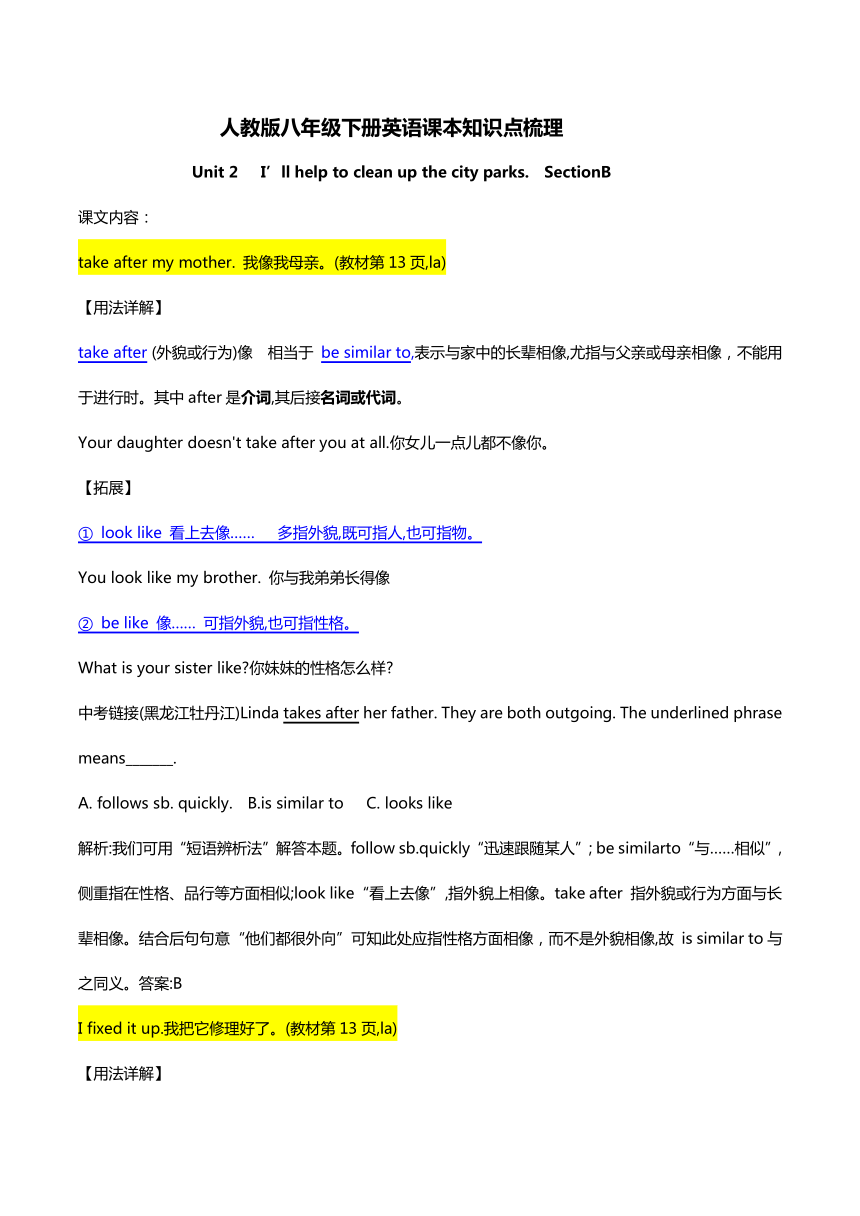
|
|
| 格式 | docx | ||
| 文件大小 | 36.9KB | ||
| 资源类型 | 教案 | ||
| 版本资源 | 人教新目标(Go for it)版 | ||
| 科目 | 英语 | ||
| 更新时间 | 2024-05-09 00:00:00 | ||
图片预览

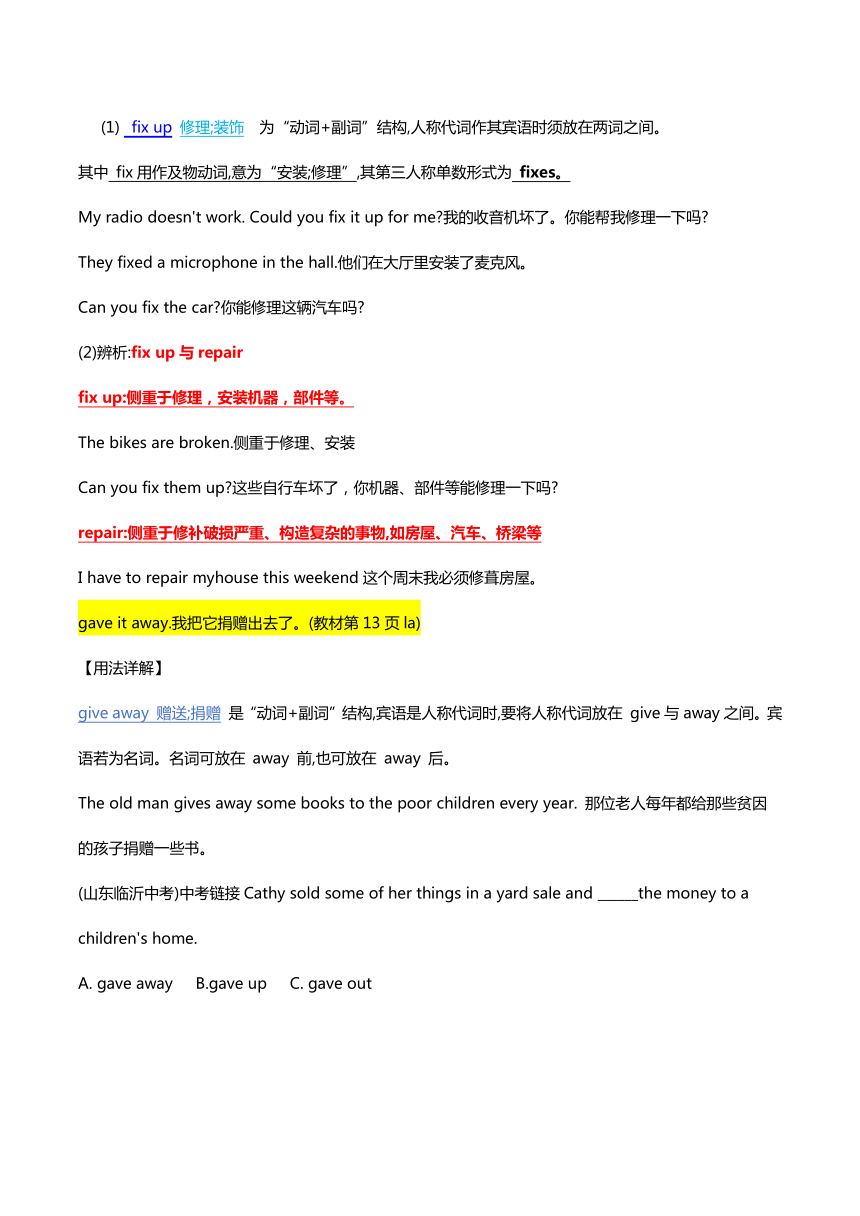
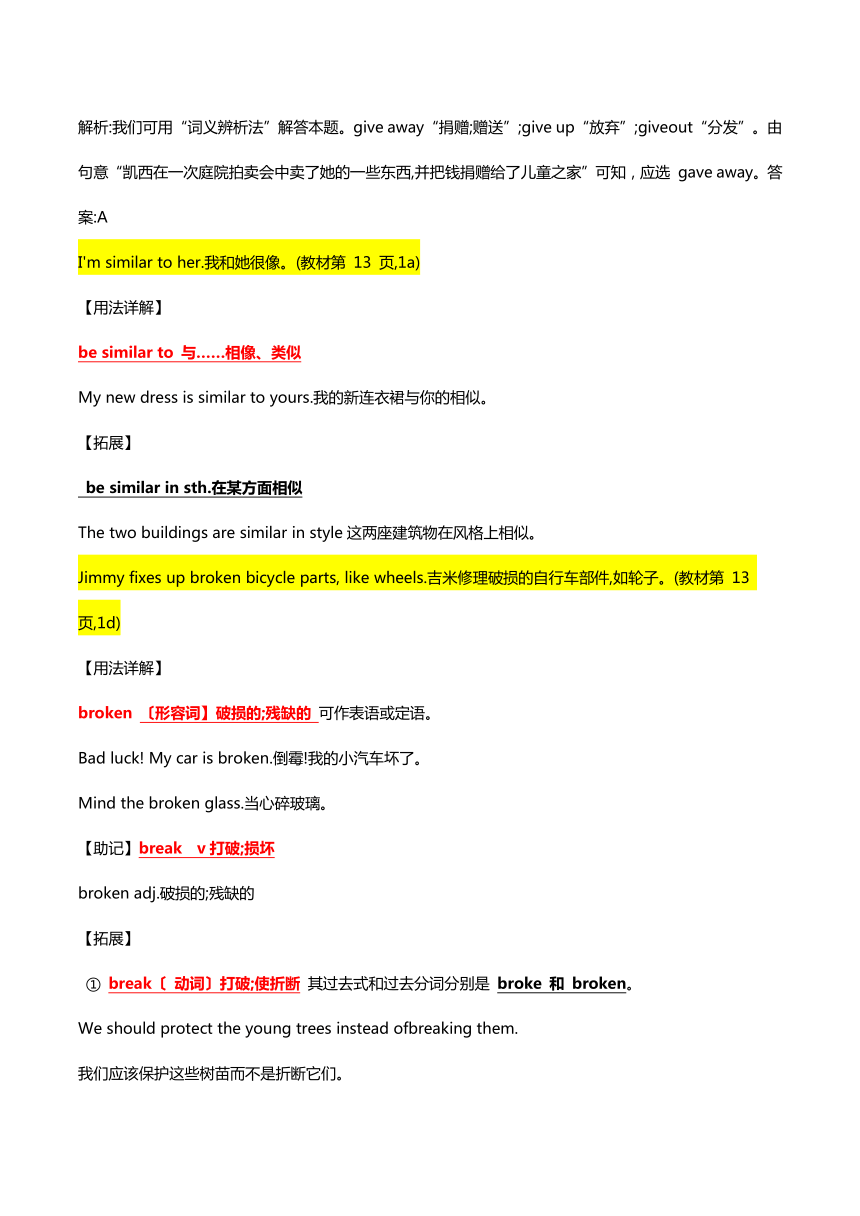
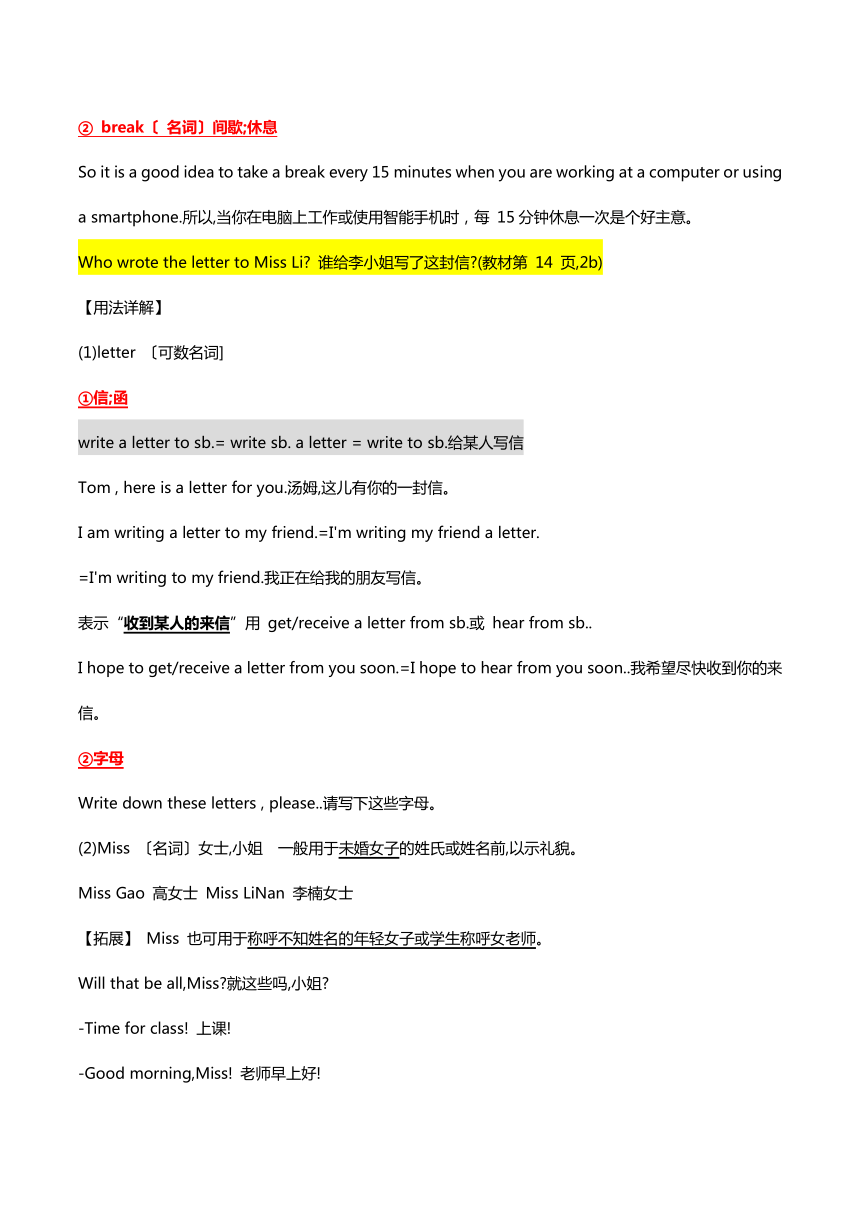
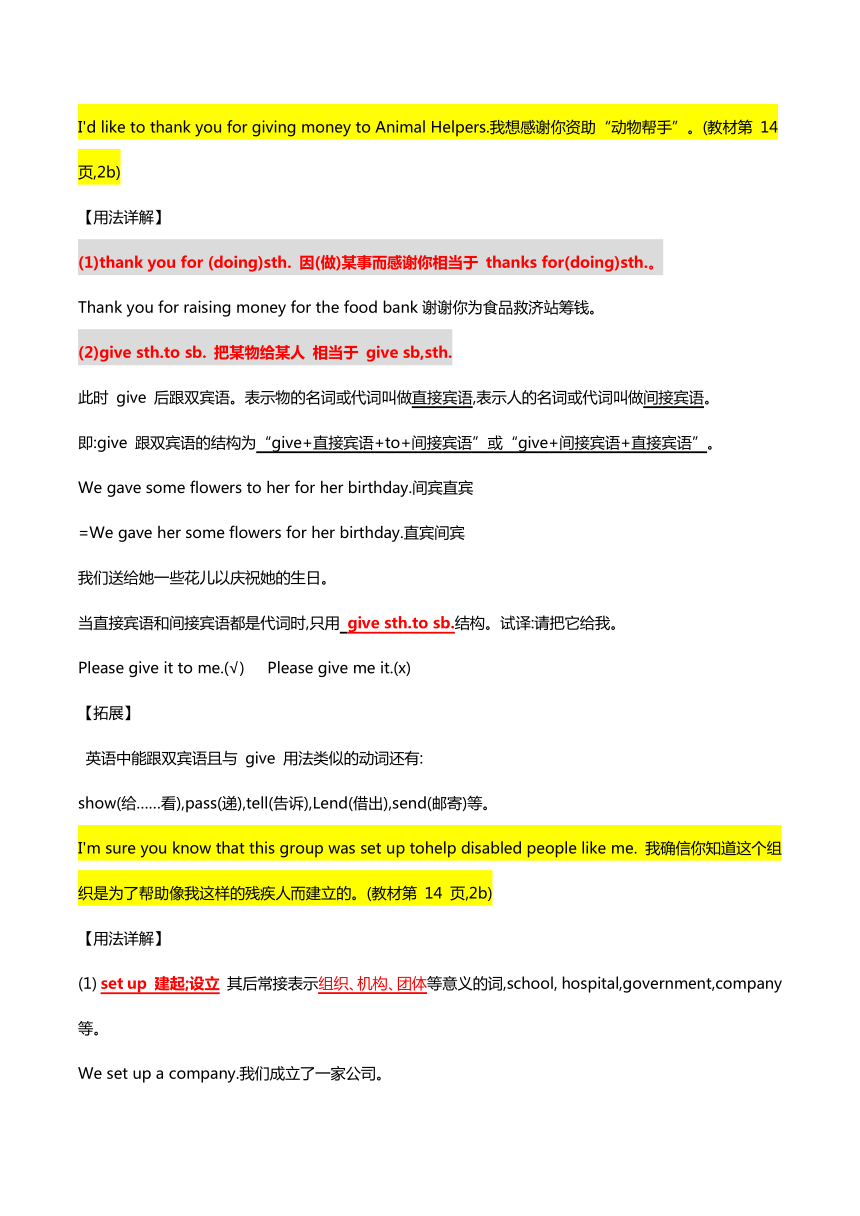
文档简介
人教版八年级下册英语课本知识点梳理
Unit 2 I’ll help to clean up the city parks. SectionB
课文内容:
take after my mother. 我像我母亲。(教材第13页,la)
【用法详解】
take after (外貌或行为)像 相当于 be similar to,表示与家中的长辈相像,尤指与父亲或母亲相像,不能用于进行时。其中after是介词,其后接名词或代词。
Your daughter doesn't take after you at all.你女儿一点儿都不像你。
【拓展】
① look like 看上去像…… 多指外貌,既可指人,也可指物。
You look like my brother. 你与我弟弟长得像
② be like 像…… 可指外貌,也可指性格。
What is your sister like 你妹妹的性格怎么样
中考链接(黑龙江牡丹江)Linda takes after her father. They are both outgoing. The underlined phrase means_______.
A. follows sb. quickly. B.is similar to C. looks like
解析:我们可用“短语辨析法”解答本题。follow sb.quickly“迅速跟随某人”; be similarto“与……相似”,侧重指在性格、品行等方面相似;look like“看上去像”,指外貌上相像。take after 指外貌或行为方面与长辈相像。结合后句句意“他们都很外向”可知此处应指性格方面相像,而不是外貌相像,故 is similar to与之同义。答案:B
I fixed it up.我把它修理好了。(教材第13页,la)
【用法详解】
fix up 修理;装饰 为“动词+副词”结构,人称代词作其宾语时须放在两词之间。
其中 fix用作及物动词,意为“安装;修理”,其第三人称单数形式为 fixes。
My radio doesn't work. Could you fix it up for me 我的收音机坏了。你能帮我修理一下吗
They fixed a microphone in the hall.他们在大厅里安装了麦克风。
Can you fix the car 你能修理这辆汽车吗
(2)辨析:fix up与repair
fix up:侧重于修理,安装机器,部件等。
The bikes are broken.侧重于修理、安装
Can you fix them up 这些自行车坏了,你机器、部件等能修理一下吗
repair:侧重于修补破损严重、构造复杂的事物,如房屋、汽车、桥梁等
I have to repair myhouse this weekend这个周末我必须修葺房屋。
gave it away.我把它捐赠出去了。(教材第13页la)
【用法详解】
give away 赠送;捐赠 是“动词+副词”结构,宾语是人称代词时,要将人称代词放在 give与away之间。宾语若为名词。名词可放在 away 前,也可放在 away 后。
The old man gives away some books to the poor children every year. 那位老人每年都给那些贫因
的孩子捐赠一些书。
(山东临沂中考)中考链接Cathy sold some of her things in a yard sale and ______the money to a children's home.
A. gave away B.gave up C. gave out
解析:我们可用“词义辨析法”解答本题。give away“捐赠;赠送”;give up“放弃”;giveout“分发”。由句意“凯西在一次庭院拍卖会中卖了她的一些东西,并把钱捐赠给了儿童之家”可知,应选 gave away。答案:A
I'm similar to her.我和她很像。(教材第 13 页,1a)
【用法详解】
be similar to 与……相像、类似
My new dress is similar to yours.我的新连衣裙与你的相似。
【拓展】
be similar in sth.在某方面相似
The two buildings are similar in style这两座建筑物在风格上相似。
Jimmy fixes up broken bicycle parts, like wheels.吉米修理破损的自行车部件,如轮子。(教材第 13 页,1d)
【用法详解】
broken 〔形容词】破损的;残缺的 可作表语或定语。
Bad luck! My car is broken.倒霉!我的小汽车坏了。
Mind the broken glass.当心碎玻璃。
【助记】break v打破;损坏
broken adj.破损的;残缺的
【拓展】
① break〔 动词〕打破;使折断 其过去式和过去分词分别是 broke 和 broken。
We should protect the young trees instead ofbreaking them.
我们应该保护这些树苗而不是折断它们。
② break〔 名词〕间歇;休息
So it is a good idea to take a break every 15 minutes when you are working at a computer or using a smartphone.所以,当你在电脑上工作或使用智能手机时,每 15分钟休息一次是个好主意。
Who wrote the letter to Miss Li 谁给李小姐写了这封信 (教材第 14 页,2b)
【用法详解】
(1)letter 〔可数名词]
①信;函
write a letter to sb.= write sb. a letter = write to sb.给某人写信
Tom , here is a letter for you.汤姆,这儿有你的一封信。
I am writing a letter to my friend.=I'm writing my friend a letter.
=I'm writing to my friend.我正在给我的朋友写信。
表示“收到某人的来信”用 get/receive a letter from sb.或 hear from sb..
I hope to get/receive a letter from you soon.=I hope to hear from you soon..我希望尽快收到你的来信。
②字母
Write down these letters , please..请写下这些字母。
(2)Miss 〔名词〕女士,小姐 一般用于未婚女子的姓氏或姓名前,以示礼貌。
Miss Gao 高女士 Miss LiNan 李楠女士
【拓展】 Miss 也可用于称呼不知姓名的年轻女子或学生称呼女老师。
Will that be all,Miss 就这些吗,小姐
-Time for class! 上课!
-Good morning,Miss! 老师早上好!
I'd like to thank you for giving money to Animal Helpers.我想感谢你资助“动物帮手”。(教材第 14页,2b)
【用法详解】
(1)thank you for (doing)sth. 因(做)某事而感谢你相当于 thanks for(doing)sth.。
Thank you for raising money for the food bank谢谢你为食品救济站筹钱。
(2)give sth.to sb. 把某物给某人 相当于 give sb,sth.
此时 give 后跟双宾语。表示物的名词或代词叫做直接宾语,表示人的名词或代词叫做间接宾语。
即:give 跟双宾语的结构为“give+直接宾语+to+间接宾语”或“give+间接宾语+直接宾语”。
We gave some flowers to her for her birthday.间宾直宾
=We gave her some flowers for her birthday.直宾间宾
我们送给她一些花儿以庆祝她的生日。
当直接宾语和间接宾语都是代词时,只用 give sth.to sb.结构。试译:请把它给我。
Please give it to me.(√) Please give me it.(x)
【拓展】
英语中能跟双宾语且与 give 用法类似的动词还有:
show(给……看),pass(递),tell(告诉),Lend(借出),send(邮寄)等。
I'm sure you know that this group was set up tohelp disabled people like me. 我确信你知道这个组织是为了帮助像我这样的残疾人而建立的。(教材第 14 页,2b)
【用法详解】
set up 建起;设立 其后常接表示组织、机构、团体等意义的词,school, hospital,government,company等。
We set up a company.我们成立了一家公司。
【拓展】
build〔 动词〕建造;建筑后接表示建筑物的名词。
They built a new house last year.去年他们建了一座新房子。
-中考链接(云南)将句子中汉语部分译成英语,注意使用适当的形式。
We are going to___________ recycling stations in our town to collect old clothes.(建立,创建)
解析:set up 意为“建立,创建”,be going to do sth.意为“打算做某事”,set 应用原形。答案: set up
disabled 〔形容词〕丧失能力的;有残疾的
the disabled 意为“残疾人”,表示一类人,为复数概念。
We should help disabled people.我们应该帮助残疾人。
The disabled need looking after.残疾人需要照顾。
【助记】
dis-(否定前缀)+ able(adj.有能力的)→disable(v 使失去能力)+-(e)d(形容词后缀)> disabled(adj. 丧失能力的;有残疾的)
【拓展】
有些词加前缀 dis- 可变为相应的反义词。
like v 喜欢→ dislike v 不喜欢
appearv 出现→ disappearv 消失
agreev 同意;赞同→ disagreev不同意;不赞同
You helped to make it possible for me to have Lucky.有了你的帮助,我才有可能拥有“幸运儿”。(教材第 14 页,2b)
【用法详解】
make it+形容词+(for sb.)to do sth. 使(某人)做某事是……的
其中it为形式宾语,真正的宾语是后面的动词不定式(短语),形容词作宾语补足语。
The spaceship makes it possible to travel to the moon宇宙飞船使去月球旅行成为可能。
【拓展】
it 作形式宾语的其他常见句型还有“think
All for one, one for all.
find it+形容词+to do sth”,意为发现做某事是……的”。
I find it difficult to talk to you.我发现跟你谈话很难。
-(长沙)The twins are so alike that even their father finds _______hard to tell them from each other.
A. it B. him C. them
解析:我们可用“固定结构法”解答本题“find+it+adj.+to do sth”为固定结构,意为“发现做某事……”,故选 A。句意:这对双胎胎是如此相像,以至于即使他们的父亲也发现难以区分他们。答案:A
Lucky makes a big difference to my life.“幸运儿对我的生活产生了很大的影响。(教材第 14页26)
【用法详解】
make a difference ( to..) (对…)产生影响 difference 前面可加修饰词,如 big,great 等; to是介词,其后可接名词、代词或动词 -ing 形式。
The accident made a great difference to his life那次事故对他的人生产生了重大影响。
【拓展】
make no difference to me. 对……没有影响这对我没什么影响。
-(湖北宜昌)The teenagers clean up the city park every Saturday.Sometimes small things can make a _________.
A. promise B.conversation C. difference D. discussion
解析:我们可用“句意分析法”解答本题。make a promise 意为“承诺,许诺”;make a conversation 意为“编对话”;make a difference意为“有影响,有作用”;make a discussion 意为“进行讨论”。句意:“青少年们每星期六打扫城市公园。”“有时小事也会有影响。故选 difference。答案:C
What would it be like to be blind or deaf (人要是)失明或者耳聋会怎么样呢 (教材第 14页,2b)
【用法详解】
blind 〔形容词〕失明的 其主语是人而非眼睛,若说明右眼或左眼失明应用“sb. + be + blind + in one's/the right/left eye”
the blind 意为“盲人”,指一类人,表示复数概念。
There is a school for blind children next to the library. 图书馆旁边有一所盲童学校。
I was sure she was blind.我确定她是盲人。
She's almost blind in her right eye.她右眼近乎失明。
【拓展】 与 blind 有关的短语
be blind to sth.对某事视而不见
tum a blind eye(to sth.)(对某事)睁一只眼闭-只眼;佯装不见
(2)deaf 〔形容词〕聋的 其主语应是人,具体到哪只耳朵失聪要用介词 in。
The man was deaf at the age of four.这个男人在4岁的时候耳朵聋了
Heis deaf in one ear.他的一只耳朵聋了
【拓展】
the deaf耳聋的人 表示复数概念。
You shouldn't laugh at the deaf.你不应该嘲笑耳聋的人。
Or imagine you can't walk or use your hands easily.或者想象一下你不能自如地走也不能自如地使用双手。(教材第 14 页,2b)
【用法详解】
imagine 〔及物动词〕想象;设想 其后可接名词、代词、动词 -ing形式或从句作宾语。
imagine(sb.)doing sth.想象(某人)做某事
Imagine life without hot water.想象一下没有热水的生活
Can you imagine( Mr. Smith )living alone on a lonely island 你能想象得出(史密斯先生)一个人在荒岛上生活吗
I can't imagine how he is used to such a bad situation.我无法想象他是怎样适应如此糟糕的情况的。
Most people would never think about this, butmany people have these difficulties. 大多数人从没考虑过这一点,但是许多人有这样的困难。(教材第 14 页,2b)
【用法详解】
diffculty
①〔可数名词〕困难;难题;难事 其形容词形式为 difcult,意为“困难的”
He met with many diffculties when traveling他在旅行中遇到了许多困难。
If you have any difficulties, give me a call.你如果遇到困难就给我打电话。
②〔不可数名词]困难,有困难”时还可用 have表示抽象意义上的have trouble/problems( in) doing sth. 表示“做某事…“困难”。
have difficulty ( in )doing sth.做某事有困难
with difficulty 费劲地
in difiiculty 处于困境中
I had great diffculty(in) finishing the task.完成这项任务我觉得很困难。
I help to clean up the city parks.
...so normal things like answering the telephone, opening and closing doors, or carrying things are diffcult for me.……因此,像接电话、开关门或搬东西这些平常的事对我来说很困难。(教材第 14页,2b)
【用法详解】
(1)open
①〔 动词〕打开
指将原来闭合着的东西打开,如将门、窗、盒子、箱子、书等物品打开,反义词为 close(关闭)。
Open the door and let fresh air in.打开门透点儿新鲜空气。
②〔 形容词〕开着的;营业的
此时反义词为 closed(关闭的,停止营业的)。
Keep the window open. It's hot inside.让窗户开着吧,里面很热。
The bank is not open on weekends.这家银行周末不营业。
(2)辨析:carry,bring,take 与get
carry: 拿;提; 表示携带、搬运、运载,具有负重的含义,没有方向性。
Please carry this bag for me. 请为我提一下这个袋子。
bring:拿来; 带来 指把人或物从别处带到说话者所在的地方
Bring the book to me,please.请把书拿过来给我。
take:拿走;带走 指把人或物从说话者所在的地方带到别处
Take my box to the room.把我的箱子拿到房间去。
get: 去取来;去拿来知道 指地区把某人或某物带来
Can you get me a bandage 你去给我来或拿来拿条绷带好吗
Then one day last year, a friend of mine helped me out.后来,去年的一天,我的一位朋友帮我摆脱了困境。(教材第 14 页,2b)
【用法详解】
(1)a friend of mine 我的一位朋友 是双重所有格,相当于 one of my friends。
英语中,如果表示所属物的名词前有冠词、数词、不定代词或指示代词,常用双重所有格,即“of+’s 所有格/名词性物主代词”的形式,来表示所属关系。
John is a friend of my father's.=John is one ofmy father's friends.约翰是我爸爸的一位朋友。
(2)help sb .out 帮助某人摆脱闲境/解决难题
help(sb.) out with 在………方面帮助(某人 )摆脱困境
I can't work out this math problem. Please help me out.我解不出这道数学题,请帮我解出来。
Would you be interested in volunteering to help out with the animals at the center 你有兴趣自愿帮助这个中心的动物吗
She talked to Animal Helpers about getting mea special trained dog.她与“动物帮手”组织联系,试图给我找一只特殊的、经过训练的狗。(教材第 14 页,2b)
【用法详解】
(1)a special trained dog 一只特殊的、经过训练的狗
trained 此处是过去分词作定语,修饰名词dogs,过去分词作定语表示被动或已经完成的动作。此处被修饰的名词 dog与 train 之间存在被动关系。
She is a trained nurse.她是一名受过训练的护士。
(2)train
①〔及物动词〕训练;培训
train sb./sth.to do sth.训练某人/某物做某事:
train sb.in sth.在某方面训练/培养某人。
Can you help me train the dog 你能帮我训练这只狗吗
We can train a horse to do farm work.我们可以训练马做农活。
The father trains his daughter in medicine.这位父亲培养他的女儿学医。
②〔不及物动词]锻炼;接受训练
相当于 exercise。
The boy is training for the school sports meeting.这个男孩正在为参加学校的运动会而训练。
③〔可数名词]火车
He goes to work by train.他乘火车去上班。
【拓展】 training〔不可数名词〕训练;培训
On the course we received training.在课上我们接受了培训。
【助记】ain(u训练:;培训)+ing(名词后奥)training(n. 训练;培训)’
l was excited about the idea of having a dog.我对拥有一只狗的主意感到很兴奋。(教材第 14 页,2b)
【用法详解】
(1)be excited about 对……感到兴奋、激动
I was excited about going to the zoo去动物园令我兴奋。
【拓展】
be excited to do sth.对做某事感到兴奋
Jack was excited to go there by plane.杰克对乘飞机去那儿感到很兴奋。
(2)辨析:excited与exciting
excited:兴奋的;激动的 作表语时,主语一般是人,作定语时修饰人
exciting:令人兴奋的;令人激动的 作表语时,主语一般是物也可用作定语,修饰物
I'm so excited that we're going to New York.我们要去纽约了,对此我很兴奋。
His work is exciting.他的工作是令人兴奋的。
You see, I'm only able to have a “dog helper"because of your kindness.因为你的仁慈,我才能有一个“狗狗帮手”!(教材第 14页2b)
【用法详解】
be able to 能够 后接动词原形,表示有能力做某事,可用于多种时态。
They will be able to tell you the news soon.他们很快就能告诉你那个消息了。
She was able to play the piano when she was five.她五岁时就会弹钢琴。
【拓展】 can〔情态动词〕能,会通常表示自身所具备的能力,只有原形(can)和过去式(could)两种形式。
He can speak French.他会说法语
When she was eight she could read English.她8岁时就会读英文了。
(2)kindness 〔不可数名词〕仁慈;善良
I will never forget your kindness.我永远忘不了你的仁慈。
【拓展】 英语中,有些形容词加后缀 -ness 可构成名词,表示性质、状态。
good- goodness 善良 ill → illness 疾病 happy- happiness 幸福
sad→sadness 悲伤
kind(adj. 善良的)+-ness(名词后缀)kindness(n.仁慈;善良)
Thank you again for changing my life. 再次感谢你改变了我的生活。(教材第 14 页,2b)
【用法详解】
change
①〔动词〕改变;变化;改造
change one’s life 改变某人的生活
change(..)into..(把……)变成…
He changed the date of the meeting yesterday.他昨天更改了会议日期。
②[可数名词〕变化
Great changes took place here in 2015.在 2015年,这儿发生了很大的变化。
③〔不可数名词]零钱
Don't forget your change.不要忘记找给你的零钱。
What are your interests and hobbies 你的兴趣和爱好是什么 (教材第 16 页,3b)
【用法详解】
interest
①〔 可数名词〕兴趣;爱好;关注
take/have an interest in =be interested in对....感兴趣
show an interest in 对……表现出兴趣
He always takes an interest in old coins
=He is always interested in old coins.他总是对古币感兴趣。
②〔及物动词〕使感兴趣;使关注
That book may interest you.那本书也许会使你感兴趣。
I'm strong in... 我的强项是……(教材第 16 页,3b)
【用法详解】
be strong in 擅长…其后可接名词、代词或动词 -ing 形式作宾语,相当于 be good at或 do well in。
此处 strong为形容词,意为“(能力 )强的;擅长的”。
He is strong in science.他擅长科学。
Unit 2 I’ll help to clean up the city parks. SectionB
课文内容:
take after my mother. 我像我母亲。(教材第13页,la)
【用法详解】
take after (外貌或行为)像 相当于 be similar to,表示与家中的长辈相像,尤指与父亲或母亲相像,不能用于进行时。其中after是介词,其后接名词或代词。
Your daughter doesn't take after you at all.你女儿一点儿都不像你。
【拓展】
① look like 看上去像…… 多指外貌,既可指人,也可指物。
You look like my brother. 你与我弟弟长得像
② be like 像…… 可指外貌,也可指性格。
What is your sister like 你妹妹的性格怎么样
中考链接(黑龙江牡丹江)Linda takes after her father. They are both outgoing. The underlined phrase means_______.
A. follows sb. quickly. B.is similar to C. looks like
解析:我们可用“短语辨析法”解答本题。follow sb.quickly“迅速跟随某人”; be similarto“与……相似”,侧重指在性格、品行等方面相似;look like“看上去像”,指外貌上相像。take after 指外貌或行为方面与长辈相像。结合后句句意“他们都很外向”可知此处应指性格方面相像,而不是外貌相像,故 is similar to与之同义。答案:B
I fixed it up.我把它修理好了。(教材第13页,la)
【用法详解】
fix up 修理;装饰 为“动词+副词”结构,人称代词作其宾语时须放在两词之间。
其中 fix用作及物动词,意为“安装;修理”,其第三人称单数形式为 fixes。
My radio doesn't work. Could you fix it up for me 我的收音机坏了。你能帮我修理一下吗
They fixed a microphone in the hall.他们在大厅里安装了麦克风。
Can you fix the car 你能修理这辆汽车吗
(2)辨析:fix up与repair
fix up:侧重于修理,安装机器,部件等。
The bikes are broken.侧重于修理、安装
Can you fix them up 这些自行车坏了,你机器、部件等能修理一下吗
repair:侧重于修补破损严重、构造复杂的事物,如房屋、汽车、桥梁等
I have to repair myhouse this weekend这个周末我必须修葺房屋。
gave it away.我把它捐赠出去了。(教材第13页la)
【用法详解】
give away 赠送;捐赠 是“动词+副词”结构,宾语是人称代词时,要将人称代词放在 give与away之间。宾语若为名词。名词可放在 away 前,也可放在 away 后。
The old man gives away some books to the poor children every year. 那位老人每年都给那些贫因
的孩子捐赠一些书。
(山东临沂中考)中考链接Cathy sold some of her things in a yard sale and ______the money to a children's home.
A. gave away B.gave up C. gave out
解析:我们可用“词义辨析法”解答本题。give away“捐赠;赠送”;give up“放弃”;giveout“分发”。由句意“凯西在一次庭院拍卖会中卖了她的一些东西,并把钱捐赠给了儿童之家”可知,应选 gave away。答案:A
I'm similar to her.我和她很像。(教材第 13 页,1a)
【用法详解】
be similar to 与……相像、类似
My new dress is similar to yours.我的新连衣裙与你的相似。
【拓展】
be similar in sth.在某方面相似
The two buildings are similar in style这两座建筑物在风格上相似。
Jimmy fixes up broken bicycle parts, like wheels.吉米修理破损的自行车部件,如轮子。(教材第 13 页,1d)
【用法详解】
broken 〔形容词】破损的;残缺的 可作表语或定语。
Bad luck! My car is broken.倒霉!我的小汽车坏了。
Mind the broken glass.当心碎玻璃。
【助记】break v打破;损坏
broken adj.破损的;残缺的
【拓展】
① break〔 动词〕打破;使折断 其过去式和过去分词分别是 broke 和 broken。
We should protect the young trees instead ofbreaking them.
我们应该保护这些树苗而不是折断它们。
② break〔 名词〕间歇;休息
So it is a good idea to take a break every 15 minutes when you are working at a computer or using a smartphone.所以,当你在电脑上工作或使用智能手机时,每 15分钟休息一次是个好主意。
Who wrote the letter to Miss Li 谁给李小姐写了这封信 (教材第 14 页,2b)
【用法详解】
(1)letter 〔可数名词]
①信;函
write a letter to sb.= write sb. a letter = write to sb.给某人写信
Tom , here is a letter for you.汤姆,这儿有你的一封信。
I am writing a letter to my friend.=I'm writing my friend a letter.
=I'm writing to my friend.我正在给我的朋友写信。
表示“收到某人的来信”用 get/receive a letter from sb.或 hear from sb..
I hope to get/receive a letter from you soon.=I hope to hear from you soon..我希望尽快收到你的来信。
②字母
Write down these letters , please..请写下这些字母。
(2)Miss 〔名词〕女士,小姐 一般用于未婚女子的姓氏或姓名前,以示礼貌。
Miss Gao 高女士 Miss LiNan 李楠女士
【拓展】 Miss 也可用于称呼不知姓名的年轻女子或学生称呼女老师。
Will that be all,Miss 就这些吗,小姐
-Time for class! 上课!
-Good morning,Miss! 老师早上好!
I'd like to thank you for giving money to Animal Helpers.我想感谢你资助“动物帮手”。(教材第 14页,2b)
【用法详解】
(1)thank you for (doing)sth. 因(做)某事而感谢你相当于 thanks for(doing)sth.。
Thank you for raising money for the food bank谢谢你为食品救济站筹钱。
(2)give sth.to sb. 把某物给某人 相当于 give sb,sth.
此时 give 后跟双宾语。表示物的名词或代词叫做直接宾语,表示人的名词或代词叫做间接宾语。
即:give 跟双宾语的结构为“give+直接宾语+to+间接宾语”或“give+间接宾语+直接宾语”。
We gave some flowers to her for her birthday.间宾直宾
=We gave her some flowers for her birthday.直宾间宾
我们送给她一些花儿以庆祝她的生日。
当直接宾语和间接宾语都是代词时,只用 give sth.to sb.结构。试译:请把它给我。
Please give it to me.(√) Please give me it.(x)
【拓展】
英语中能跟双宾语且与 give 用法类似的动词还有:
show(给……看),pass(递),tell(告诉),Lend(借出),send(邮寄)等。
I'm sure you know that this group was set up tohelp disabled people like me. 我确信你知道这个组织是为了帮助像我这样的残疾人而建立的。(教材第 14 页,2b)
【用法详解】
set up 建起;设立 其后常接表示组织、机构、团体等意义的词,school, hospital,government,company等。
We set up a company.我们成立了一家公司。
【拓展】
build〔 动词〕建造;建筑后接表示建筑物的名词。
They built a new house last year.去年他们建了一座新房子。
-中考链接(云南)将句子中汉语部分译成英语,注意使用适当的形式。
We are going to___________ recycling stations in our town to collect old clothes.(建立,创建)
解析:set up 意为“建立,创建”,be going to do sth.意为“打算做某事”,set 应用原形。答案: set up
disabled 〔形容词〕丧失能力的;有残疾的
the disabled 意为“残疾人”,表示一类人,为复数概念。
We should help disabled people.我们应该帮助残疾人。
The disabled need looking after.残疾人需要照顾。
【助记】
dis-(否定前缀)+ able(adj.有能力的)→disable(v 使失去能力)+-(e)d(形容词后缀)> disabled(adj. 丧失能力的;有残疾的)
【拓展】
有些词加前缀 dis- 可变为相应的反义词。
like v 喜欢→ dislike v 不喜欢
appearv 出现→ disappearv 消失
agreev 同意;赞同→ disagreev不同意;不赞同
You helped to make it possible for me to have Lucky.有了你的帮助,我才有可能拥有“幸运儿”。(教材第 14 页,2b)
【用法详解】
make it+形容词+(for sb.)to do sth. 使(某人)做某事是……的
其中it为形式宾语,真正的宾语是后面的动词不定式(短语),形容词作宾语补足语。
The spaceship makes it possible to travel to the moon宇宙飞船使去月球旅行成为可能。
【拓展】
it 作形式宾语的其他常见句型还有“think
All for one, one for all.
find it+形容词+to do sth”,意为发现做某事是……的”。
I find it difficult to talk to you.我发现跟你谈话很难。
-(长沙)The twins are so alike that even their father finds _______hard to tell them from each other.
A. it B. him C. them
解析:我们可用“固定结构法”解答本题“find+it+adj.+to do sth”为固定结构,意为“发现做某事……”,故选 A。句意:这对双胎胎是如此相像,以至于即使他们的父亲也发现难以区分他们。答案:A
Lucky makes a big difference to my life.“幸运儿对我的生活产生了很大的影响。(教材第 14页26)
【用法详解】
make a difference ( to..) (对…)产生影响 difference 前面可加修饰词,如 big,great 等; to是介词,其后可接名词、代词或动词 -ing 形式。
The accident made a great difference to his life那次事故对他的人生产生了重大影响。
【拓展】
make no difference to me. 对……没有影响这对我没什么影响。
-(湖北宜昌)The teenagers clean up the city park every Saturday.Sometimes small things can make a _________.
A. promise B.conversation C. difference D. discussion
解析:我们可用“句意分析法”解答本题。make a promise 意为“承诺,许诺”;make a conversation 意为“编对话”;make a difference意为“有影响,有作用”;make a discussion 意为“进行讨论”。句意:“青少年们每星期六打扫城市公园。”“有时小事也会有影响。故选 difference。答案:C
What would it be like to be blind or deaf (人要是)失明或者耳聋会怎么样呢 (教材第 14页,2b)
【用法详解】
blind 〔形容词〕失明的 其主语是人而非眼睛,若说明右眼或左眼失明应用“sb. + be + blind + in one's/the right/left eye”
the blind 意为“盲人”,指一类人,表示复数概念。
There is a school for blind children next to the library. 图书馆旁边有一所盲童学校。
I was sure she was blind.我确定她是盲人。
She's almost blind in her right eye.她右眼近乎失明。
【拓展】 与 blind 有关的短语
be blind to sth.对某事视而不见
tum a blind eye(to sth.)(对某事)睁一只眼闭-只眼;佯装不见
(2)deaf 〔形容词〕聋的 其主语应是人,具体到哪只耳朵失聪要用介词 in。
The man was deaf at the age of four.这个男人在4岁的时候耳朵聋了
Heis deaf in one ear.他的一只耳朵聋了
【拓展】
the deaf耳聋的人 表示复数概念。
You shouldn't laugh at the deaf.你不应该嘲笑耳聋的人。
Or imagine you can't walk or use your hands easily.或者想象一下你不能自如地走也不能自如地使用双手。(教材第 14 页,2b)
【用法详解】
imagine 〔及物动词〕想象;设想 其后可接名词、代词、动词 -ing形式或从句作宾语。
imagine(sb.)doing sth.想象(某人)做某事
Imagine life without hot water.想象一下没有热水的生活
Can you imagine( Mr. Smith )living alone on a lonely island 你能想象得出(史密斯先生)一个人在荒岛上生活吗
I can't imagine how he is used to such a bad situation.我无法想象他是怎样适应如此糟糕的情况的。
Most people would never think about this, butmany people have these difficulties. 大多数人从没考虑过这一点,但是许多人有这样的困难。(教材第 14 页,2b)
【用法详解】
diffculty
①〔可数名词〕困难;难题;难事 其形容词形式为 difcult,意为“困难的”
He met with many diffculties when traveling他在旅行中遇到了许多困难。
If you have any difficulties, give me a call.你如果遇到困难就给我打电话。
②〔不可数名词]困难,有困难”时还可用 have表示抽象意义上的have trouble/problems( in) doing sth. 表示“做某事…“困难”。
have difficulty ( in )doing sth.做某事有困难
with difficulty 费劲地
in difiiculty 处于困境中
I had great diffculty(in) finishing the task.完成这项任务我觉得很困难。
I help to clean up the city parks.
...so normal things like answering the telephone, opening and closing doors, or carrying things are diffcult for me.……因此,像接电话、开关门或搬东西这些平常的事对我来说很困难。(教材第 14页,2b)
【用法详解】
(1)open
①〔 动词〕打开
指将原来闭合着的东西打开,如将门、窗、盒子、箱子、书等物品打开,反义词为 close(关闭)。
Open the door and let fresh air in.打开门透点儿新鲜空气。
②〔 形容词〕开着的;营业的
此时反义词为 closed(关闭的,停止营业的)。
Keep the window open. It's hot inside.让窗户开着吧,里面很热。
The bank is not open on weekends.这家银行周末不营业。
(2)辨析:carry,bring,take 与get
carry: 拿;提; 表示携带、搬运、运载,具有负重的含义,没有方向性。
Please carry this bag for me. 请为我提一下这个袋子。
bring:拿来; 带来 指把人或物从别处带到说话者所在的地方
Bring the book to me,please.请把书拿过来给我。
take:拿走;带走 指把人或物从说话者所在的地方带到别处
Take my box to the room.把我的箱子拿到房间去。
get: 去取来;去拿来知道 指地区把某人或某物带来
Can you get me a bandage 你去给我来或拿来拿条绷带好吗
Then one day last year, a friend of mine helped me out.后来,去年的一天,我的一位朋友帮我摆脱了困境。(教材第 14 页,2b)
【用法详解】
(1)a friend of mine 我的一位朋友 是双重所有格,相当于 one of my friends。
英语中,如果表示所属物的名词前有冠词、数词、不定代词或指示代词,常用双重所有格,即“of+’s 所有格/名词性物主代词”的形式,来表示所属关系。
John is a friend of my father's.=John is one ofmy father's friends.约翰是我爸爸的一位朋友。
(2)help sb .out 帮助某人摆脱闲境/解决难题
help(sb.) out with 在………方面帮助(某人 )摆脱困境
I can't work out this math problem. Please help me out.我解不出这道数学题,请帮我解出来。
Would you be interested in volunteering to help out with the animals at the center 你有兴趣自愿帮助这个中心的动物吗
She talked to Animal Helpers about getting mea special trained dog.她与“动物帮手”组织联系,试图给我找一只特殊的、经过训练的狗。(教材第 14 页,2b)
【用法详解】
(1)a special trained dog 一只特殊的、经过训练的狗
trained 此处是过去分词作定语,修饰名词dogs,过去分词作定语表示被动或已经完成的动作。此处被修饰的名词 dog与 train 之间存在被动关系。
She is a trained nurse.她是一名受过训练的护士。
(2)train
①〔及物动词〕训练;培训
train sb./sth.to do sth.训练某人/某物做某事:
train sb.in sth.在某方面训练/培养某人。
Can you help me train the dog 你能帮我训练这只狗吗
We can train a horse to do farm work.我们可以训练马做农活。
The father trains his daughter in medicine.这位父亲培养他的女儿学医。
②〔不及物动词]锻炼;接受训练
相当于 exercise。
The boy is training for the school sports meeting.这个男孩正在为参加学校的运动会而训练。
③〔可数名词]火车
He goes to work by train.他乘火车去上班。
【拓展】 training〔不可数名词〕训练;培训
On the course we received training.在课上我们接受了培训。
【助记】ain(u训练:;培训)+ing(名词后奥)training(n. 训练;培训)’
l was excited about the idea of having a dog.我对拥有一只狗的主意感到很兴奋。(教材第 14 页,2b)
【用法详解】
(1)be excited about 对……感到兴奋、激动
I was excited about going to the zoo去动物园令我兴奋。
【拓展】
be excited to do sth.对做某事感到兴奋
Jack was excited to go there by plane.杰克对乘飞机去那儿感到很兴奋。
(2)辨析:excited与exciting
excited:兴奋的;激动的 作表语时,主语一般是人,作定语时修饰人
exciting:令人兴奋的;令人激动的 作表语时,主语一般是物也可用作定语,修饰物
I'm so excited that we're going to New York.我们要去纽约了,对此我很兴奋。
His work is exciting.他的工作是令人兴奋的。
You see, I'm only able to have a “dog helper"because of your kindness.因为你的仁慈,我才能有一个“狗狗帮手”!(教材第 14页2b)
【用法详解】
be able to 能够 后接动词原形,表示有能力做某事,可用于多种时态。
They will be able to tell you the news soon.他们很快就能告诉你那个消息了。
She was able to play the piano when she was five.她五岁时就会弹钢琴。
【拓展】 can〔情态动词〕能,会通常表示自身所具备的能力,只有原形(can)和过去式(could)两种形式。
He can speak French.他会说法语
When she was eight she could read English.她8岁时就会读英文了。
(2)kindness 〔不可数名词〕仁慈;善良
I will never forget your kindness.我永远忘不了你的仁慈。
【拓展】 英语中,有些形容词加后缀 -ness 可构成名词,表示性质、状态。
good- goodness 善良 ill → illness 疾病 happy- happiness 幸福
sad→sadness 悲伤
kind(adj. 善良的)+-ness(名词后缀)kindness(n.仁慈;善良)
Thank you again for changing my life. 再次感谢你改变了我的生活。(教材第 14 页,2b)
【用法详解】
change
①〔动词〕改变;变化;改造
change one’s life 改变某人的生活
change(..)into..(把……)变成…
He changed the date of the meeting yesterday.他昨天更改了会议日期。
②[可数名词〕变化
Great changes took place here in 2015.在 2015年,这儿发生了很大的变化。
③〔不可数名词]零钱
Don't forget your change.不要忘记找给你的零钱。
What are your interests and hobbies 你的兴趣和爱好是什么 (教材第 16 页,3b)
【用法详解】
interest
①〔 可数名词〕兴趣;爱好;关注
take/have an interest in =be interested in对....感兴趣
show an interest in 对……表现出兴趣
He always takes an interest in old coins
=He is always interested in old coins.他总是对古币感兴趣。
②〔及物动词〕使感兴趣;使关注
That book may interest you.那本书也许会使你感兴趣。
I'm strong in... 我的强项是……(教材第 16 页,3b)
【用法详解】
be strong in 擅长…其后可接名词、代词或动词 -ing 形式作宾语,相当于 be good at或 do well in。
此处 strong为形容词,意为“(能力 )强的;擅长的”。
He is strong in science.他擅长科学。
同课章节目录
- Unit 1 What's the matter?
- Section A
- Section B
- Unit 2 I'll help to clean up the city parks.
- Section A
- Section B
- Unit 3 Could you please clean your room?
- Section A
- Section B
- Unit 4 Why don't you talk to your parents?
- Section A
- Section B
- Unit 5 What were you doing when the rainstorm came
- Section A
- Section B
- Review of Units 1-5
- Unit 6 An old man tried to move the mountains.
- Section A
- Section B
- Unit 7 What's the highest mountain in the world?
- Section A
- Section B
- Unit 8 Have you read Treasure Island yet?
- Section A
- Section B
- Unit 9 Have you ever been to a museum?
- Section A
- Section B
- Unit 10 I've had this bike for three years.
- Section A
- Section B
